Why the creator of GTA and the lead designer of Diablo II are making a Facebook game together
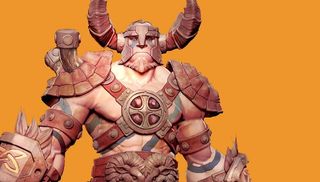
The enormous careers of Dave Jones (Lemmings, Grand Theft Auto, Crackdown, APB) and Stieg Hedlund (Diablo, Diablo II, Ghost Recon), are intersecting in ChronoBlade , an action-RPG published on Facebook. I visited Jones and Hedlund at their studio in San Francisco to talk about what brought them together, their thoughts on the value of independence, and the changing role of publishers in the game industry.
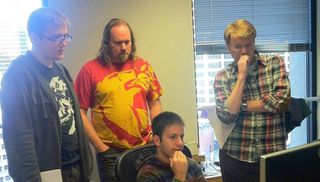
PCG: You're veteran PC game developers. What's interesting to you guys about Facebook as a platform?
Dave Jones: We've worked on many kinds of games across many genres, many platforms, many markets. What was interesting was, for the first time ever, I'd seen my wife, my father-in-law, my mother-in-law playing games, which they'd never done before. Mainly because of Facebook games. We can all call into question if they're really games or not, but hey, at least they were doing something I'd never seen them do before. Just because they were so easy to go into… You don't have to buy it. You don't have to go to the store. You don't need a gaming system. There was something about that. If you make it really accessible like that, it does break down barriers. That's when we came together.
"Being on a huge team is really hard. But having all these new markets is just great."
We thought it would be interesting if all these new generation of gamers were there, what if we did some of the games that we like to play, but made them what we call “hyper accessible.” We thought it was interesting that Facebook allowed you to do that. But the tech was pretty low-tech. In those days it was still the original Flash. It was very low-tech. But at the same time, Adobe were talking about launching Flash 11 and saying, “Hey, we're going to start tapping into the GPU.” For us as core gamers, that was pretty interesting. You could maybe do some decent-looking games on Facebook. That's what it all sprung from.
We thought what would be great is if we could do a great combat-action-brawler game, because those have always been popular. We hadn't done one for a while. It felt like we were going back in time a little bit with this tech, back to Street Fighter, Virtua Fighter, Tekken kind of games. But to give it real longevity, what if we added this great full RPG backend to it as well? So we felt that we had the design skills ourselves to do the moment to moment play control, but we needed someone like Stieg to… We wanted a really good backend, a complete Diablo-style backend for the RPG systems. That's how we put the team together. That was about 18 months ago now.
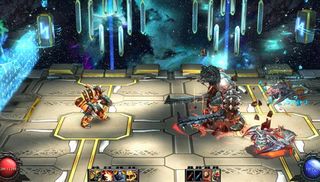
"One of the other appealing things about Facebook in particular is that you have a really direct relationship with the audience."
Do you feel like you sought out this situation because you value independence? You don't have to work with a publisher. Is that part of the appeal?
Jones: It's definitely a part of the appeal, yeah. They don't bring any kind of preconceived ideas. They're not trying to change the model, which is always slow and cumbersome to do. It was easier to be independent and just do the classic San Francisco raise-some-VC-finance route. [laughs] That's why we're here. And just give it a go.
PC Gamer Newsletter
Sign up to get the best content of the week, and great gaming deals, as picked by the editors.
Stieg Hedlund: I think one of the other appealing things about Facebook in particular is that you have a really direct relationship with the audience. You have a live game and you get feedback directly from them about what they like and what they don't like. Both in terms of comments they send in and the data about where they're going and what they're engaging with in your game. You can continue to refine the game and make it better and better as you go. As far as the game being kind of retro, I think we acknowledge the past, but particularly the first couple of generations of Facebook games were super backward looking. They were games from the '80s and '90s, really. The early '90s. We definitely try to take the feeling of games like Dave just mentioned, but really do a new spin on them. It's obviously a hybrid. It's all of those things. But I think we're making something very new and different, instead of just remaking things that already exist.
Talking about the idea of independence, with Kickstarter and Steam Greenlight and lots of other publishing platforms—Facebook is one of them… I think a lot of people would say that we're entering an era where publishers are decreasing in relevance, decreasing in importance. I'm curious if you would agree with that, or if that's something you would celebrate.
Jones: I would disagree with it. [laughs] It's not like there's one market for gaming and the whole market goes one way. I still love console gaming. I love the big budgets. I love E3. I love seeing what's new and what's coming. Those are big, expensive games to make. Publishers do back and do pay for some of those big, big titles. I'm looking forward to GTA 5. I would hate to be in a world where that stuff goes away. I think we need that as well. I would say about five to six years ago, I was more worried that the market was going the other way, where everything… There was only one market for video games and it was massive triple-A. Studios were dying. If it wasn't for this resurgence of new platforms—social, mobile, tablet—I'm actually grateful that we do have lots of different ways now. For a while I was worried about where a new generation of game designers was going to come from. Being on a huge team is really hard. But having all these new markets is just great. Notch is the absolute prime example, and going back to some of the great iOS games, Rovio and so on. For me, I think you need everything. I think you need the full ecosystem. I'm glad we have this.
Hedlund: I'd agree with that. I'd jump in on the fact that there is a place for us as indies to say, “We're going to do something that's different.” We don't need a big publisher buy-in to get it going. We've had a good response so far. We were able to identify something that people would like. Sometimes publishers can be a barrier to that, where they don't get it or they want to change the vision of the game so it fits more with things that they're familiar with.
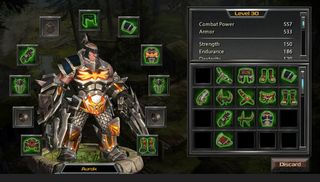
I'm wondering if you guys think that there is a stigma among core gamers about Facebook games—that they're not for them, or they're too simple…
Jones: Oh, there is. [laughs]
So with that being the case, how do you guys address that?
Jones: I think it's hard to address. We've seen a lot of comments from people like Steam players. “Oh, this game looks awesome, but it's on Facebook, so I'm not going to play it.” It's kind of cutting off your nose to spite your face a little bit, you know? What do we do to address that? To be honest, what we're trying to do is say, “Hey, if we bring something that is really good, and the only place to get it just now is on Facebook, maybe we can start to turn that a little bit.” We're not going to try and preach at people and convince them to do it. I have a funny feeling that if there's peer pressure -- if people's friends start playing it and they get an invite and they tell them that it's a really good game, you should come try it – then I think we can deliver something that changes that perception. Hopefully that's a good way to do it.
Hedlund: Yeah. Again, like David was saying before, our reasoning is that because it's accessible to everyone… That's the key to what we're doing. We probably will eventually move to other platforms, but Facebook makes sense as a starting point. We want people to be able to play together, and it just seems like the best way to do it right now. Just like David was saying, it's a fantastic game. Everybody looks at it and says, “Hey, this doesn't look like a Facebook game.” That's our goal. We're not trying to be a Facebook game. We're trying to be a really good game that's on Facebook.
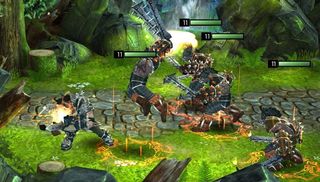
Jones: There's definitely something powerful in it. It's the first time I've ever worked on a game where… You can be speaking to somebody on the phone. You don't know what gaming system they have. They say, “What are you working on?” “Oh, I'm working on this game.” “That sounds pretty cool.” “Actually I'll just send you a link right now and you can jump in and we'll play together.” It's so easy. There's something pretty cool about that. Games, I think, have to be as accessible as possible. You want to show somebody a clip from a movie, you just click YouTube. You don't have to worry about what system they have or how long it takes them to install something.
Hedlund: Yeah. There's also the try before you buy kind of mentality. Steam is great, but I have to be convinced by my friends that something is worth paying for and downloading before I'm going to do it. Here you can just jump in and find out.
Jones: That puts the pressure on us, because we know that they have absolutely no vested interest in this game. They can decide in 20 or 30 seconds. “Nah, that's not for me.” It puts a lot of pressure on developers, going over to this free, hyper accessible model. You've got 20 or 30 seconds. They haven't paid any money. They don't feel like they have to play for a little while to get into it because they've spent money on it. It's really good, I think. All game developers should develop a Facebook game at some point in their career. I think you learn a hell of a lot. You have to think about things very differently. It just broadens your skill set a little bit. It's one of the reasons I was really excited to do something on Facebook. People said, “Facebook?” Yeah, but it does broaden your skill base. It does make you think, from a design perspective, very differently about some things. Some of that stuff may go across, eventually… If we ever do a core game on console or something, I think it's a very valuable thing to have gone through.
Hedlund: Yeah. In a way, you have to be extremely respecting of your player's time. Just like you were saying, there's no buy-in. You have to say, “Hey, we're going to give you the best experience we possibly can. We're not going to bullshit around.”
Check back early next week for a conversation with Dave Jones about the life, death, and rebirth of APB .

Evan's a hardcore FPS enthusiast who joined PC Gamer in 2008. After an era spent publishing reviews, news, and cover features, he now oversees editorial operations for PC Gamer worldwide, including setting policy, training, and editing stories written by the wider team. His most-played FPSes are CS:GO, Team Fortress 2, Team Fortress Classic, Rainbow Six Siege, and Arma 2. His first multiplayer FPS was Quake 2, played on serial LAN in his uncle's basement, the ideal conditions for instilling a lifelong fondness for fragging. Evan also leads production of the PC Gaming Show, the annual E3 showcase event dedicated to PC gaming.
Most Popular





